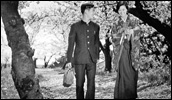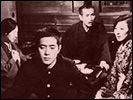Her Brother
- Year
- 1960
- Original title
- Otouto
- Japanese title
- おとうと
- Director
- Cast
- Running time
- 98 minutes
- Published
- 15 December 2008


by Roger Macy
Kon Ichikawa's 1960 film is part of a package of films going round the world through 2008-09 under the 'Homage to Madame Kawakita' banner. It's made up of films by eight directors linked by being past winners of the Kawakita Prize. This makes them a diverse bunch of post-war films and it would be a very fortunate Japanese film enthusiast who couldn't find new treasures to discover amongst those on show. At the BFI in London, they were screened under the label 'Japanese Gems'. The mixture has the great advantage of not piling up too many films by a single director - a grumble that has been reasonably put when dozens of films, packed convoy-form have been squeezed into a month's viewing. For this flotilla there could be no such complaint and we were spoilt for varied delights from a healthy range of genres.
Kon Ichikawa only died in February 2008. He had a major retrospective at the BFI some five years ago, but this was an excellent opportunity to catch up with this director's large and varied output. Like all the other directors in this season, he was represented by three films: A Full-Up Train, Conflagration (based on Mishima's famous novel Temple of the Gold Pavilion / Kinkakuji) and Her Brother. Leavening our viewing were introductions to selected films, some by critic Tadao Sato and others by a Japan specialist who has emerged much more recently from the U.K., Alexander Jacoby.
Alex had the job of introducing Her Brother. Ichikawa's work isn't the easiest to describe in a brief introduction, as he was prepared to tackle any amount of material in his career. Recalling that Ichikawa had divided his own films into 'light' and 'dark', Alex reconstructed the contrast as being between the ironic and the sentimental (in the best sense of the word). There was no doubt that we had already seen the ironic - and sardonic - in A Full-Up Train but Her Brother was a film much more prepared to examine emotional bonds.
Her Brother turned out to be a film of surprising beauty with memorable compositions that engage eye and sympathy. Ichikawa has said that he suppressed the colour scheme to 'evoke the dark feeling of Taisho', but I think that undersells the visual impression of the film. Whilst the range of reds, russets, and clarets might not have been quite as opulent as those in another Taisho era film in the season, Seijun Suzuki's Zigeunerweisen, the richness of the range of deep reds constantly enlivened interest and helped to emphasise the leading character's emotional sympathies. For this film has to be read through the thoughts of Gen, the daughter, played by Keiko Kishi. Gen is one of the two named characters in the film along with her brother Hekiro, played by Hiroshi Kawaguchi. It would be tempting to slip 'titular' in front of 'her brother', but it shouldn't be; the film - and the book on which it is based - is entirely focused on the standpoint of Gen and the title of the film should more emphatically be translated as 'My Brother'.
A further way in which I have to agree with praise for the sentimentality of the film is in the music. The use of western music in Japanese films of this period can often be alienating to western ears, when it is least supposed to, due to the feeling of over-the-top sentimentality. But Yasushi Akutagawa's music brings further nuance to the story-telling through its own use of a reduced palette.
But there was one aspect where Kon Ichikawa seemed to take pleasure in retaining his sardonic streak. 'Father' was played by one of the most renowned of all Japanese actors, Masayuki Mori, in surely one of his least flattering roles. Cinema, and not just Japanese cinema, abounds with bad-father roles. I think I could count the good-father roles in cinema on one hand - and I don't just mean good men who happened to have a child, but ones who are good at parenting. But 'Father' in Ichikawa's film still ranks as one of cinema's all-time bad fathers. He's emotionally cold (until the last moment of the film), he's lax even when confronted by his family, damagingly indulgent of his son, and callous with his daughter. And despite working from home, he's simply not there.
But this 'Father' is not any old father. Japanese viewers would have all known at the time that the film was made from a highly topical novel by Aya Koda, clearly autobiographical of her own life and, in particular, of her very famous father. Rohan Koda is as renowned in Japanese literature as, say, Charles Dickens, but much more highbrow. Rohan was sufficiently famous for his writing (and his drinking), that Aya could find herself in the papers just for working in a sake shop. It was only after Rohan's death that Aya could begin to write, and eventually write her masterpiece, Flowing, memorably made into a film by Mikio Naruse. By all accounts (and I rely heavily on Alan Tansman's book for information), Aya gave a more nuanced account of her father than Ichikawa and scriptwriter Yoko Mizuki allow. I fancy that either or both of them still resented spending time in school reciting his storm description from The Five-Storied Pagoda. At any rate, Rohan gets a thorough pasting in this film.
But as the title of the film's title suggests, at least in Japanese, it's the relationship between elder sister and younger brother that lies at the centre of the film. Mother, as in real life, is long dead. Kinuyo Tanaka has to act the role of a struggling stepmother who cannot find her role in the family and gets no support from Rohan in checking little brother. Apart from the beautifully recreated opening scene, Gen and the other women are nearly always filmed inside, whereas Ichikawa uses highly contrasted outdoors scenes to convey the driven, impetuous character of little brother.
I had never previously thought of Kon Ichikawa and Mikio Naruse as sharing the same muse, but in Aya Koda they certainly did. And, even as a Naruse devotee, I'd have to concede that Ichikawa's Her Brother is, visually and aurally, a much more advanced film. Both directors' reputations rest strongly on their literary adaptations. Like Naruse, it's tempting to speculate how much Ichikawa's career was boosted with close association with female scriptwriters. Whilst a very few Japanese actresses have stepped up to being director, I cannot think of any female scriptwriter who took this route through which many male directors had passed. It seems, reader, they had to marry them. In fact, this is one of the few films of this period that was not written by Ichikawa's wife, Natto Wada, since both story and script had already been published.
It's a film that is sometimes hard to watch, not sensually but because the characters, particularly the brother, are reckless and hurtful. And it hurts to see Gen increasingly accept her role as defender of her undeserving brother. Finally, in a beautifully composed conclusion, in a way I should only hint at, and in complete fidelity to Aya's book, Gen moves from resentful protection to a complete lowering of defences for a spoilt and needy brother. As Ichikawa put it, quoted in James Quandt's book, "The task of loving one another - parent and child, husband and wife, sister and brother - only comes to be understood as taxing, irreplaceable, and precious once an active awareness of aloneness is established." It doesn't sound much, but I was not alone in thinking we had seen one of Kon Ichikawa's finest films.